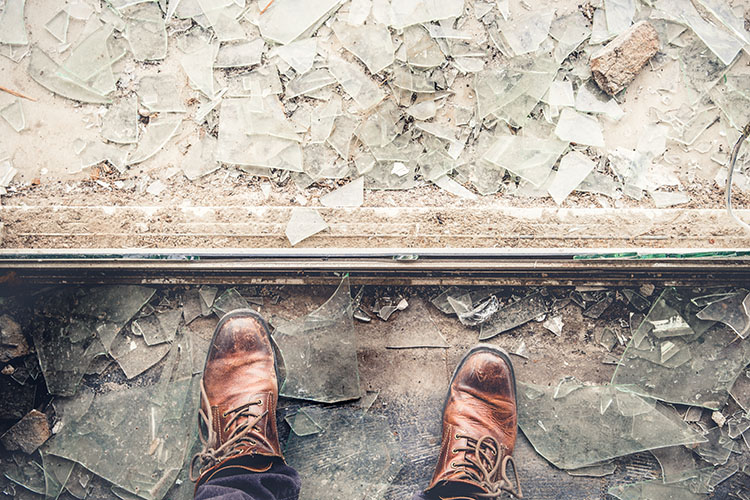- Home
- Home Care Services
- Disability Support NDIS
- Home Care Packages
- Resources
- Blog
- Contact
- COVID-19

Right at Home Blog
Disaster Preparedness For Seniors
3 Suggestions to ensuring your safety from the caregivers at Right at Home.

Hurricane-force storms. Raging floodwaters. Surging wildfires. No matter where we live, natural disasters, and even the man-made ones like arson fires and toxic spills, typically strike quickly and without warning. No one is immune from the effects of disasters, particularly the elderly.
We know disasters are inevitable in many locations, so it is important that we learn how to safeguard ourselves, and our older loved ones from potential devastating effects.
Preparation is crucial.
In an emergency, basic services including water, gas, electricity and communications may be cut off, and markets, filling stations and pharmacies may be closed or crippled with long lines. The key to withstanding disasters is readiness.
"With emergency situations, we need to consider the special needs of aging loved ones who are confined to a bed, are wheelchair-bound or who have limited mobility, cognition, vision or hearing," CEO of Right at Home Daryl Sahli said. "Some of the most tragic losses in times of disaster are the seniors who couldn't leave their homes to get to safety. With a little planning, aging seniors can stay safe and comfortable in times of disasters and emergencies."
Here are 3 suggestions from the care specialists at Right at Home.
1. Secure a supply kit
- Flashlight and first aid kit
- Batteries and blankets
- Cash, as machines may be inaccessible
- Adequate supplies of water, nonperishable food, medications, hygiene items, etc. for a minimum of three days
- Supplies for pets or service animals
- Pack supplies in an easy-to-transport container such as a seal-tight plastic bin or waterproof duffle bag. A storage container with wheels is even better.
- Keep the supply kit ready in a handy place, and be sure to include your identification and family and friends' emergency contact information.
- Label any ambulatory equipment such as walkers, canes and wheelchairs.
- Every six months, or as needs change, review the survival kit contents and keep supplies updated.
- In addition, a vehicle supply kit should include a tyre repair kit, jumper cables and flares, sunscreen and items that provide shade, such as a wide-brimmed hat.
2. Create a personal support network and plan.
Whether they are family members, neighbours, friends or professional caregivers, seniors need a group of people who can offer hands-on assistance in disasters. The elderly need to talk with a circle of helpers about personal limitations and concerns, and an action plan should be created to resolve these issues. Planning should include home escape routes, community response and evacuation plans, transportation needs, family/friend communication contacts, and relevant emergency documents/health information. Keeping copies of important documents such as birth certificates, identification cards, wills, passports, insurance and financial records in a fire-protected container or separate location also is advised. Thinking through safe places in the home and other available shelter is essential. Those with in-home caregivers should ask about available assistance in times of emergency. All members of the personal support network should review the agreed-upon disaster plan and test it occasionally to be sure it works.
3. Stay informed.
Ask about national and local disaster preparedness guidelines for seniors. Older adults should know in advance community warning systems and how they will be notified in a possible emergency, especially if they have problems hearing a telephone or viewing television or computer screens. Many communities have neighbourhood disaster preparedness groups already in place for emergencies. Check in advance with local fire stations, ambulance services and other first responders who may come door to door with emergency warnings or use special radios that have hazard alerts.
Our message.
"Helping older loved ones plan for possible disasters and community emergencies reduces anxiety, injuries and life-threatening situations," Sahli said. "Possessions can be replaced, but the preciousness of life cannot. We can all help each other by planning for disasters – it's not a matter of if, but when."
Founded in 1995, Right at Home offers in-home companionship and personal care, and assistance to seniors and disabled adults who want to continue to live independently and age in their home. Right at Home Australia is your local expert for issues related to caring for your loved ones, and is dedicated to keeping you informed about home care. With no admin or subscription fees Right at Home allows you to get more care from your package or budget.
To find out more, please give us a call on 1300 362 609 or visit our website.
Subscribe to our newsletter
Sign up to our newsletter to receive our latest news and information.
Blog Categories
Enjoyed reading our blog?
Subscribe to our monthly newsletter and receive all the best content from across the Right at Home Australia network straight to your inbox.
Our Locations
Queensland
New South Wales
Western Australia
Australian Capital Territory
South Australia
Victoria
Our Locations
Central West New South Wales
Gosford
Hunter & Port Stephens
Macarthur Penrith
Newcastle
Northern Rivers
Padstow St George
Southern NSW
Sydney Central & Eastern Suburbs
Sydney Five Dock
Sydney Inner West
Sydney Liverpool
Sydney Lower North Shore
Sydney Norwest
Sydney Northern Beaches
Sydney Parramatta
Sydney Ryde
Sydney Sutherland Shire
Sydney The Hills
Sydney Upper North Shore

© Copyright 2024 Homecare Group Pty Ltd ABN 31 166 722 658 ALL RIGHTS RESERVED
Right at Home, Unit 4 16-36 Nile Street 31 Woolloongabba, Brisbane QLD 4102


